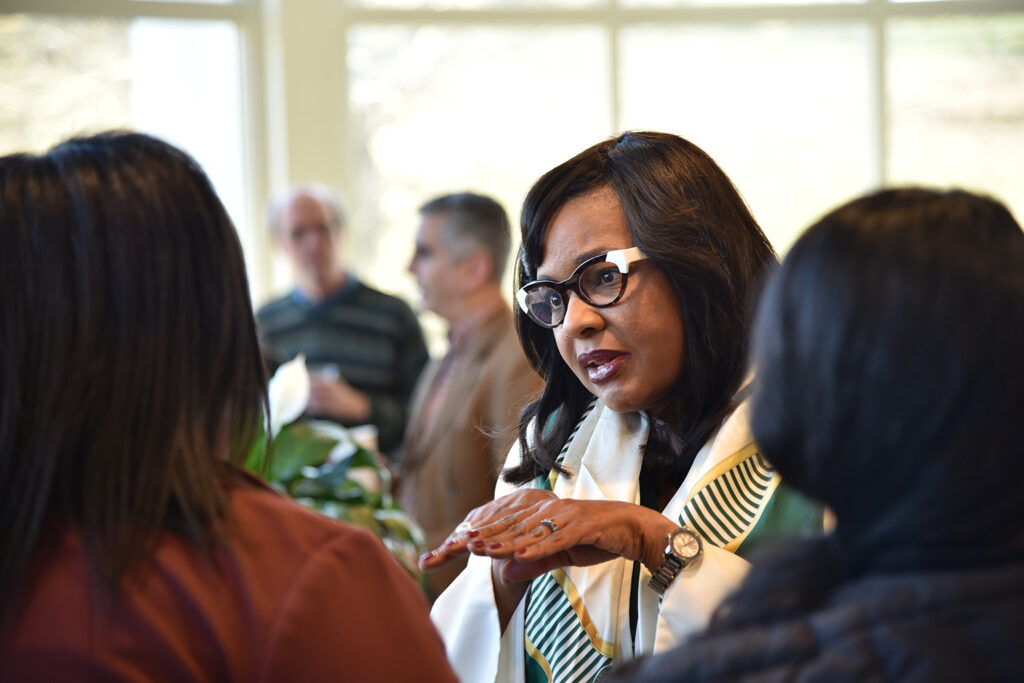Mary Dana Hinton brings blend of religious experiences, insights to presidency
The new president of Hollins University, Mary Dana Hinton, Ph.D., has deep roots in Baptist tradition, like the school she has led since August 2020. The first African American president in its history is also drawing upon her experiences in Catholic higher education as the leader of the secular women’s college near Roanoke.
Born in Mt. Vernon, New York, and raised in North Carolina, Hinton said the historic Black church was a big part of her life.
“I may be in one of the last generations that had this experience,” she said in a video interview from her home office, “but the church was just how you understood your humanity, how you understood the humanity of those around you. It was where you learned to protest injustice but to do so with a sense of hope and with a sense of humility and with a sense of respect.”
Journey in Catholic higher education
Before coming to Hollins, Hinton was president of the College of Saint Benedict, the nation’s only Benedictine college for women, in St. Joseph, Minnesota. Her career in Catholic higher education began with earning a doctorate in religion and religious education from Fordham University.
The belief that faith and reason have no conflict seemed to be “something I’d been looking for…for a long time: how do I live a life of vibrant faith and a life of deep intellectual curiosity and not ever be made to feel that there’s a competition between the two, that they enrich one’s life when placed in dialogue with one another.”
Hinton said her life was also enriched by teaching religious education and working as multicultural student coordinator at College Misericordia (now Misericordia University) and encountering the values of the Sisters of Mercy: service, justice, hospitality — values that she said also affirmed her experience in the historic Black church.
“It affirmed the humanity and worth of all people,” she said. “It affirmed the fact that the deepest stirrings of your soul manifest themselves in all that you do in your private life and professional life.”
Impact of religious sisters
Those sisters also showed her the importance of having and following a mission.
“They taught me that your mission is central to everything that you do, so any decision that we make at Hollins, we start by thinking about what is our mission and how do we go back to that,” Hinton said.
The Sisters of Mercy, the Dominican sisters she met while vice president for academic affairs at Mount St. Mary College in New York, and the Benedictines of St. Ben’s and their emphasis on community all “remind me of ways women in the historic Black church used their voice to battle racism and sexism, and here are these vowed religious women who were using their voice to do incredible work.”
Being on Catholic campuses, living out that life of faith and reason, attending Mass frequently all led her to fully embrace the faith during her time at St. Ben’s.
“There wasn’t a single moment when I made the decision,” she said. “I think it was the evolving recognition that I could be in communion with these communities of religious women with whom I had worked and dwelled, and that it didn’t have to take away from or diminish my experience growing up in the historic Black church…And I’m grateful that I don’t have to deny or forgo either of those experiences. I think they make me whole and they affirm one another in many ways.”
Inspired by Catholics — past, present
One of the saints she finds affirming is St. Hildegard of Bingen (1098-1179) an abbess, visionary, composer and poet — a woman, Hinton said, who was not always understood in her time.
“She called forth in herself and in those she encountered their best selves,” Hinton noted. “One author writes that she sung at a note that others couldn’t always hear, but they felt the music that emanated from her.”
Hinton takes inspiration, too, from the life of St. Julian of Norwich (1343-circa 1416), a theologian and mystic known for “Revelations of Divine Love,” the first book written in English by a woman. Julian spent most of her life in seclusion, watching the world deal with a plague. Hinton said she’s been thinking a lot about her these days.
One of the most meaningful, recent developments in the Catholic Church for her is the naming of Archbishop Wilton D. Gregory of Washington as the first Black American cardinal.
“Everyone wants to see folks like them in these roles, and that’s a good thing. That reflects the work that Cardinal Gregory has done,” she said. “It’s just an exciting moment to see someone do this work and get this recognition from Pope Francis. I also think it’s further evidence of the inclusive way in which Pope Francis views Catholicism, and I find that to be really heartening and engaging.”
Hinton; Robert Williams, her husband of 23 years; and their children, Hallela, Hillel and Hosanna, have not had a chance to get involved with a local parish because of the university’s strict social distancing policies, but Hinton is looking forward to a return to more traditional fellowship once the pandemic subsides. That will be a time when, as Julian of Norwich wrote, “all shall be well, all shall be well, and all manner of things shall be well.”

